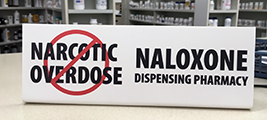
SPH: 2024-2026 Opioid Abatement: Naloxone Training
The number of drug overdose deaths in the United States increased by nearly 30% from 2019 to 2020. - At the same time, nearly 75% of drug overdose deaths in 2020 were from opioids. - From 2019 to 2020, opioid-involved death rates increased significantly. Many deaths from opioids are accidental from taking someone else's prescription, not understanding the dosage or timing to take the prescription, using drugs recreationally, or accepting drugs from friends, family, or others. - Over-the-counter nasal Naloxone administration provides one way that people can abate the deaths caused by these deadly substances.
Target Audience
This activity is intended for preparing community health workers and certified public health professionals.
Learning Objectives
At the conclusion of this activity, participants should be able to:
- Discuss the harm of Fentanyl/opioids when misused.
- Recognize the signs of an opioid overdose.
- Respond to an opioid overdose by using nasal Naloxone (Two Pack).
- Safeguard the community served from accidental opioid exposure and overdose death.
Disclosures
In accordance with the appropriate accrediting bodies, all planners, teachers, and authors with control over activity content are required to disclose to the provider any relevant financial relationships (those held by the person, currently or within the last 24 months) with ineligible interests. Accredited providers are required to provide this information to learners before the start of an activity. The University of North Texas Health Science Center at Fort Worth Division of Academic Innovation's office planning team nor the subject matter experts have anything to disclose.
Primary Authors

Teresa Wagner, DrPH, MS, CPH, RD/LD, CPPS, CHWI, DipACLM, CHWC
Associate Professor, Health Administration & Policy, School of Public Health
Associate Professor, Personalized Health & Well-Being, School of Health Professions
Interim Director and Clinical Executive for Health Literacy, SaferCare Texas
Director, Texas State Certified CHW/CHWI Training Program
University of North Texas Health Science Center at Fort Worth
CE & Assessment Department
Donnell McKenzie, MA
Program Manager
CE & Assessment Department, Division of Academic Innovation, University of Texas Health Science Center at Fort Worth
Brenda Wilson, MS, CHCP
Senior Instructional Designer
CE & Assessment Department, Division of Academic Innovation, University of Texas Health Science Center at Fort Worth
Teresa Wagner, DrPH, MS, CPH, RD/LD, CPPS, FNAP, CHWI, DipACLM, CHWC
Teresa Wagner, DrPH, MS, CPH, RD/LD, CPPS, FNAP, CHWI, DipACLM, CHWC
Accreditation Statements
Community Health Workers
This course is certified through the Texas Department of Human Services Site #63 in partnership with the Texas Association of Promotores & Community Health Workers Site #69.
This course is certified for 1 hours.
(Knowledge Base – 1.0)
National Board of Public Health Examiners
The University of North Texas Health Science Center is accredited by the National Board of Public Health Examiners' Certified Public Health recertification program. This is designated for 1 contact hours.
Certified Instructors:
Teresa Wagner, DrPH, MS, CPH, CPPS, RD/LD, CHWI, DipACLM, CHWC #393
Available Credit
- 1.00 Community Health Worker (CHW)
- 1.00 Certified Public Health (CPH)
- 1.00 HSC Participation
Price
Required Hardware/software
This activity is best experienced using the most current browser (or one back) of Firefox, Chrome, Safari, Internet Explorer, or Microsoft Edge. For all activities featuring audio, you must have a sound card and speakers. To view graphic images and references that appear in separate "pop-up" windows, you must have session cookies enabled on your computer. Adobe Acrobat Reader may be required for certain activities.
Accessibility Statement
If you require special assistance to participate in this activity, please call (817) 735-2539 or email: [email protected]. An Equal Opportunity University.

 Facebook
Facebook X
X LinkedIn
LinkedIn Forward
Forward